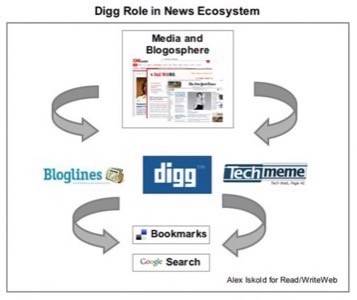Advertising in the blogosphere, and indeed the web at large, is driven by page views. And Google, which also relies on page views and unique visitors to make money, is one of the best traffic generators.

However, getting traffic from Google is not simple. AdWords campaigns generate far more traffic than those placed with AdSense
because with search people express intent (and are more likely to click on contextually relevant ads). But tuning AdWords campaigns to generate a lot of traffic
is not easy since you are competing with other bidders and Google’s algorithm.

Thus, many top tier blogs have begun to rely on a different source of traffic – the web’s number one social news site Digg.
Getting to the front page of Digg leads to a such traffic surge that it has been known to cripple web servers. Thousands of Digg users
instantly flock to the source site as soon as a story hits Digg’s front page, causing traffic to spike on web sites well higher than usual levels.
But Digg has a much more important role than that of traffic generator. It has become an experiment in human-based,
self-organizing systems and the point of origin from which important news gets spread through the web. In this post
we look at what Digg is today, beyond its bare front page, and look into what Digg’s future holds.
How Digg Works
The concept behind Digg is simple. Any Digg user can submit a news article pointing to a page on the web.
Once the article is in the system other users cast votes and when, based on the votes, the article is deemed interesting,
a link to it is published to the front page of the site. Despite its simple description, the actual algorithm has considerable complexity.
The software that powers the site is designed to make sure that the system is fair. And just like people are trying to
game search engines using SEO, people have been trying to game Digg, so the algorithm itself is constantly evolving.

Valleywag just recently published a post explaining how Digg’s algorithm works in 100 words.
Naturally, the post itself made the Digg front page.
Nicholas Carlson highlights the following factors that influence if a post gets to the front page:
- User participation: The algorithm takes into consideration participation history of the submitter and each voter.
- Submitter track record: Previous success makes it harder to succeed again.
- Diggs from top users: Rapid diggs from top diggers cause a jump to the front page.
- Number of votes: How the number of votes on the story compares to the average number of votes on any story.
- Category: Stories in Technology have more competition than in Sports, for example.
- Velocity: The faster diggs come, the more likely for the story to pop to the front page.
- Comments: The number and the substance of the comments counts as well.
Getting Dugg
If your submission hits on all cylinders of the Digg algorithm, and your site makes it to the front page of Digg, then you
and your hosting company are in for a treat. Digg hits can come at a rate of 1 hit per second. That’s
60 hits a minute and 3,600 hits per hour! Lets put this in perspective. The front page alone has 15 stories, so
it originates 54,000 clicks per hour or 1.3M clicks per day. This is a huge number.
We know that Digg hit 1 million registered users back in March.
What is interesting is to estimate the number of users actively watching the front page. Assuming that a watcher has time to check all stories during a one hour period, then
there are at least 3,600 people at any given time who are actively watching front page.
But the Digg front page is not only a hot place to get a link published, it is a filter in the bigger
game of information dissemination on the web.
Digg and News Dissemination
Digg is a filter. It may not be perfect, but it is a human-powered information filter. What passes through
is what is interesting to people, or more precisely what is interesting to Digg users. Lets take a look at the role
that Digg plays in the news ecosystem.

News that originates at media companies and in the blogosphere follows along a few paths. First, raw news
come to aggregators like Bloglines, Google Reader and Netvibes. Another flow is to the automatic popularity sites like Techmeme.
Unlike Digg, Techmeme is powered by an algorithm and computes popularity of stories based on the number of sources talking about it and linking to each other.
The third pass is through Digg, which is a human-powered news filter. The best stories that people find are bookmarked
and stored permanently on sites like del.icio.us.
The most interesting path is of those stories that get to the front page of Digg and then get stored on sites like del.icio.us.
These stories would appear to be both interesting today and carry long term value, since people bother to bookmark them. Google has been utilizing
this path in its index, giving a heavier weight to these results.
Digg and Self-Organization
Beyond news, there is another very interesting aspect to Digg. It is one of the most successful
human-made, self-organizing systems. For the past few decades, scientists have been discovering how seemingly
simple rules give rise to Complex Systems. One of the
major principles that they discovered is the principle of Self-Organization.

Self-organization is a truly remarkable phenomenon present in diverse physical, biological and social systems.
The phenomenon is at the very heart of how a galaxy forms, how ants cooperate in colonies, and how humans form societies.
Biologists use self-organization to study pattern formation on animal skins, flocking behavior in birds, and auto-catalytic
chemicals that seem to explain the origin of life itself.
While self-organization works naturally, it has not been easy to reproduce via engineering. And this is another
aspect of Digg that is very interesting – it is a scientific experiment in human-induced self-organization. True,
the system is not entirely self-regulating, since the company had to improve the algorithm to protect the system from abuse.
Yet, for the most part it really is more or less self-regulating. The recent example of exposure of the HD-DVD key
underscores that Digg has a life of its own.
The Digg Effect
Digg is important in many ways. It is one of the pioneers of social software; it is one of the first man-made,
self-organizing systems that actually works; it is a filter which sifts a lot of the the signal from the noise of the web.
What is Digg’s future? It depends on many factors. First is the question of monetization – can Digg be a sustainable
business on its own? According to Alexa the traffic has not been rising. There have long been rumors of a possible acquisition, and if that happens, the future will depend on who acquires the site. In any case, it is unlikely that a direct standalone
competitor will emerge to overtake it.
Likely, more and more sites will continue to incorporate story voting.
But that is not really a threat to Digg. The whole point of Digg is that it is a web-wide news filter, so silos can not rival it.
This is what a lot of people miss – the magic is in Digg’s distributed nature and aggregation, not in the ability to vote on the stories.
How do you use Digg? What do you like and not like about how it works today? Let us know in the comments below.










